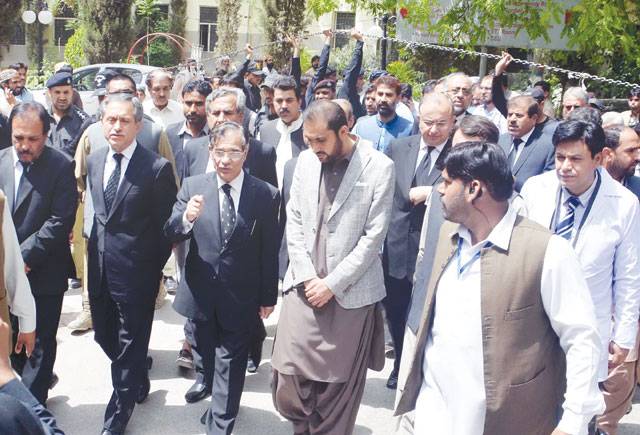QUETTA - Chief Justice of Pakistan Saqib Nisar on Monday summoned former Balochistan chief ministers Dr Abdul Malik Baloch and Nawab Sanaullah Zehri to appear before the court and explain what they did for improving governance during their tenures.
A three-member bench, headed by the CJP and including Justice Sajjad Ali Shah and Justice Syed Mansoor Ali Shah, was hearing different cases at the apex court’s Quetta registry regarding the plight of public hospitals and medical colleges, and a doctors’ strike in the province.
“Three chief ministers came during a single tenure [of central government] but what did they do for improvement of governance [in the province]?” the CJP asked. “Call these chief ministers who ruled here for more than four years,” he ordered.
Incumbent Chief Minister Abdul Quddus Bizenjo also appeared along with Health Minister Mir Majid Abro at the Supreme Court’s Quetta registry during the hearing of the doctors strike case.
Following the hearing, the two accompanied the chief justice on his visit to hospitals in the provincial capital.
The hearing focused on the deteriorating condition of government hospitals and medical colleges and the bench posed a number of questions about the state of health and education facilities in the province.
Education Secretary Noorul Haq Baloch informed the court that unfortunately over one million children in the province remain out of schools as around 2.6 million children should have been currently enrolled. “Why has the government failed to enrol out of school children?” the chief justice asked.
Health sector
Taking up the matter of poor plight of health sector, the CJP expressed surprise over the closure of Out Patient Departments (OPDs) in government hospitals and remarked that health and water should be given prime importance, and an ordinary citizen should be offered low-cost treatment.
Secretary Health Saleh Nasar informed the court that a policy was being planned within the next ten days to improve the condition of government-run hospitals.
The CJP also probed the health secretary regarding the number of ventilators and Electronic Control Units (ECU) in public hospitals and asked, “Who will tend to the patients if the doctors are on strike?”
The chief justice remarked that the health sector should seek assistance from the government for improving the current situation. “Let us know what help you require from the federation,” he told the officials.
Justice Saqib Nisar asserted that he would want provision of water and healthcare to become the primary focus of the government. “According to Articles 184 and 199 of the Constitution, we have the right to intervene wherever basic human rights are violated.”
The chief justice in the recent past has also expressed his extreme displeasure at the state of health, education and other public sectors in Sindh.
The top court has taken up multiple suo motu notices on different aspects of governance in Punjab, and only a few days ago it termed the performance of the Punjab government as the ‘worst’.
The court has also summoned record of different cases, including alleged corruption in 56 public sector companies, non-availability of clean water and bad condition of hospitals in the most populous province of the country.
Medical colleges and paramedics strike
During Monday’s hearing in Quetta, the CJP said that “unfortunately, our medical colleges [too] are substandard”, and he repeated his commitment to ensure that the colleges don’t charge exorbitant fees.
“We want the money to be returned to 20 million students,” he said, adding that all amounts above Rs856,000 in annual fees should be returned by the medical colleges.
The chief justice expressed his desire to visit Balochistan hospitals and remarked that the province is important to them.
Later, he visited Quetta Civil Hospital where he interacted with the patients and visited the strike camp of paramedics and young doctors. He ordered the authorities to listen to the protesting medics’ demands and present a report to him following which the medics called off their strike.
The bench is expected to continue hearing of the cases at the Quetta registry until Wednesday.
Meeting with Hazaras
A delegation of the Hazara community also called on the chief justice and apprised him of their issues. Justice Nisar assured the delegation of resolving the community’s issues in accordance with the law.
Sectarian terrorism in Balochistan has disproportionately targeted people from the Hazara community, who belong to minority Shia denomination of Islam.
A report released by the National Commission for Human Rights last month stated that 509 Hazaras were killed and 627 injured in various incidents of terrorism in Quetta during the last five years.
CJP summons ex-CMs to know what they did for province






